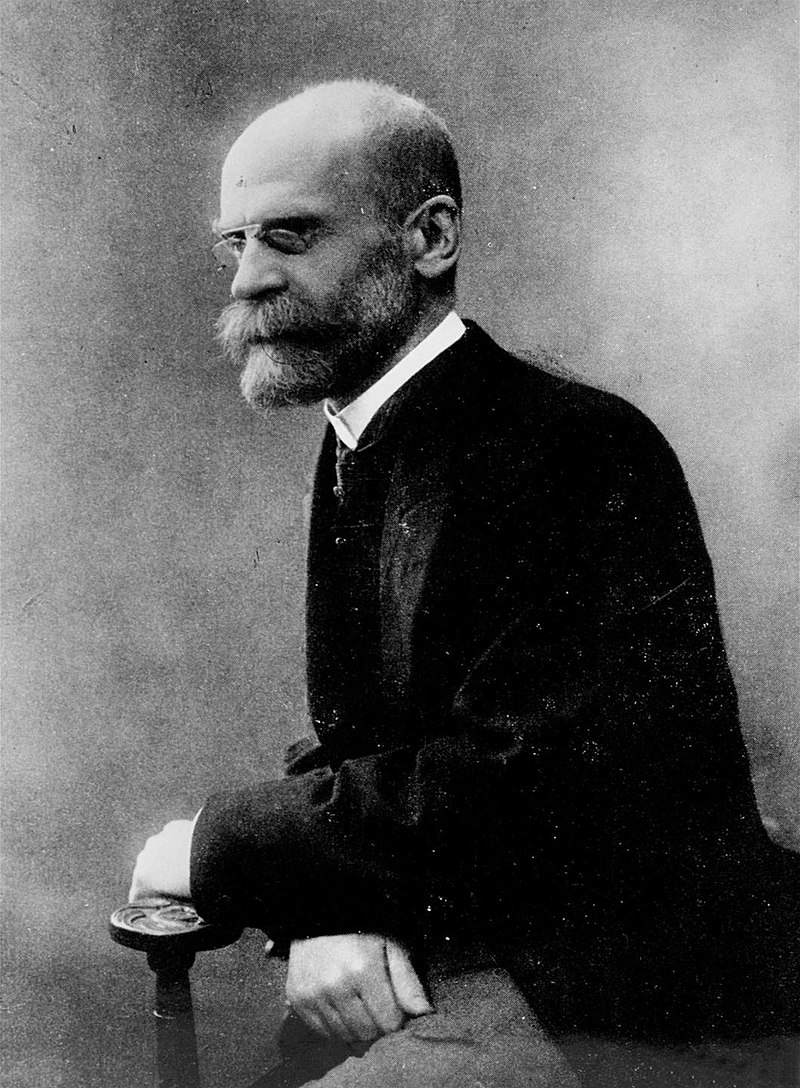Emile Durkheim
“To love society is to love something beyond us and something in ourselves.”
Summary
- French sociologist who is one of the Founders of Sociology
- Discussed how external human patterns influences the individual known as social facts
- Structural functionalist who considered crime to be a normal part of society
- Introduced concept of anomie: a condition in which society provides little moral guidance to the individual
- Discussed how religion makes people come together and have solidarity
- Defined collective conscious as traditions and social norms that bind people together
- Talked about mechanical solidarity and organic solidarity
- Introduced the theory of suicide

Introduction
- Emile Durkheim (1858-1917) was a French sociologist who had two major professional goals:
- To get sociology recognized as a separate discipline;
- To show how social forces affect peoples behaviors.
- He achieved the first goal in 1887 when the University of Bordeaux awarded him the world’s first academic appointment in sociology.
- To accomplish his second goal, Durkheim conducted rigorous research about the suicide rates of European countries. He found a pattern that every country had a stable suicide rate year after year. He also found that males, Protestants and the unmarried are more likely to commit suicide. He concluded that members of these groups lack social integration and have fewer social bonds as they are comparatively more independent than the rest. Although many years have passed since Durkheim’s research, the principle he uncovered about suicide rates still apply to modern society.
- The central idea behind Durkheim’s research was that “human behavior is not restricted to the individual, the social forces surrounding the individual also affect their behavior”. For example, suicide may seem like a personal problem of an individual that needs to be studied by psychologists. However, suicide patterns studied by sociologists are largely consistent over time suggesting that the problem is not just confined to the individual but rather to the whole society.
Society and Social Facts
- Durkheim realized that society is more than the individual who compose it. It was present before us, it shapes our lifestyle and it will remain after we pass on.
- Patterns of human behavior - cultural norms, values, beliefs - which influence the individual are known as social facts. In other words, social facts are anything in society that puts external pressure on a member of society to act in a certain way.
- As society is bigger than us, it has the power to guide our thoughts and actions. Some examples are:
- A classroom of college students taking a math exam.
- A family gathered around a table sharing a meal.
- People quietly waiting their turn in a doctor’s office.
- The different music people listen to in different parts of the world.
Durkheim and Structural Functionalism
- Durkheim also talked about the concept of function. Society should be analyzed and described in terms of functions. Society is a system of interrelated parts where no one part can function without the other. These parts make up the whole of society. If one part changes, it has an impact on society as a whole. Functionalism emphasizes a societal equilibrium. Based on Durkheim’s perspective, some examples are:
- The state provides public education for children. The family of the children pays taxes, which the state uses for public education. The children who learn from public education go on to become law-abiding and working citizens, who pay taxes to support the state. If any of these functions are disrupted, then the society as a whole will be affected.
- Crime and delinquent behavior also helps promote stability in the society as it leads to a reaction from the victims. If there are enough reactions from the members of the society, this leads to a common consensus that a certain action is considered harmful. Thus, it is considered morally wrong and a law is established against it resulting in stability. Durkheim concluded that crime is “normal” for the basic of reasons: A society could not exist without it.
Personality and Society
- Durkheim also believed that society helped people form their personalities.
- He believed that human beings have endless wants and are in a constant danger of being overpowered by our own desires; society restrains humans from these endless wants and provides social regulation. As he put it, “The more one has, the more one wants, since satisfactions received only stimulate instead of filling needs”.
Anomie
- Compared to traditional societies, modern societies impose less restrictions on human beings. Durkheim believed that these fewer restrictions provide more freedom to the individuals but also leads to increased anomie, a condition in which society provides little moral guidance to the individual.
- People with lavish lifestyles with no restrictions suffer from this concept of anomie e.g. celebrities. They typically feel disconnected from their society because they no longer see the norms and values that they hold dear reflected in society itself.
Religion and Social Solidarity
Durkheim considered religion to be the initial source of social solidarity and collective life. He described religion to act as a differentiating force between right and wrong. It allows man to separate sacred things from material objects. When humans participate in sacred ceremonies, it elevates the position of man in society. Without religion, there would be no distinction of good and bad. Social and cultural norms would cease to exist.
Durkheim identified three major functions of religion:
- Religion unites people, promoting social cohesion.
- Religion encourages people to obey cultural norms, promoting conformity.
- Religion gives meaning and purpose to life.
Mechanical Solidarity and Organic Solidarity
-
Like Marx and Weber, Durkheim lived through the rapid social change that swept across Europe during the nineteenth century as the Industrial Revolution unfolded. But Durkheim offered his own understanding of this change.
- Durkheim defines collective conscious as traditions and social norms that bind people together. Durkheim assumes that humans are inherently egoistic. Collective consciousness (i.e. norms, beliefs, and values) forms the moral basis of the society resulting in social integration.
- In preindustrial societies, Durkheim stated that this collective conscious is so strong that the community moves quickly to punish anyone who challenges the age-old traditions. Durkheim used the term mechanical solidarity to refer to these social bonds because these bonds were ‘mechanical’ - people are locked together with an automatic sense of belonging together and acting similar without actually questioning why they are doing it in the first place.
-
In industrial societies, however, these social bonds grow weaker and weaker. As a result, people are much less bound by tradition but rather interdependence due to specialization. People become dependent on each other to do different tasks and as a result, make new social bonds that feel ‘organic’. The solidarity which was once rooted in likeness is now based on differences who find that their specialized work — as plumbers, college students, midwives, or sociology instructors — makes them rely on other people for most of their daily needs. Durkheim called this type of solidarity, organic solidarity.
- For Durkheim, a key to change in society was the division of labor and specialization. As members of modern societies, we depend more and more on people we trust less and less. Therefore, modern societies rest less on moral consensus and more on functional interdependence. However, this leads to what is called the Durkheim Dilemma - modern societies have personal freedom at the cost of declining morality and the risk of increasing anomie. Nevertheless, Durkheim was optimistic: he thought personal freedom was important and to reduce the risk of increasing anomie, people would create new laws and norms.
Theory of Suicide
According to Durkheim, the two main factors which influence suicide are positive integration in a society and negative integration in a society. The four types of suicide that Durkheim explained are:
- Egoistic suicide
- Anomic suicide
- Altruistic suicide
- Fatalistic suicide
1. Egoistic Suicide
Egoistic suicide occurs when there is negative integration and group solidarity grows weak. The individual believes that they are superior to the society and as a result, stops taking interest in the matters of the society or family. The individual feels isolated from society and considers life and death to be equal. This is a situation where social norms fail to put appropriate pressure on the members of society. Such suicide is found more in Organic societies than Mechanical societies.
2. Anomic Suicide
Anomic Suicide also occurs when there is negative integration because society undergoes rapid changes. This results in the norms and manners of society being broken and individuals are unable to adjust themselves which results in a normative gap. Social laws are considered weak in this situation since they fail to control the behavior of the individual. Society tends to fall into despair and there is uncertainty about the future. Anomic suicide is rooted in societies with a lack of regulation. Lawlessness prevails, business slows down, projects get cancelled or postponed, marriages are postponed. Social norms are shattered. Disorganization is prevalent.
3. Altruistic Suicide
Altruistic Suicide occurs when the society has a very high degree of group solidarity and positive integration. The people consider the interests of the group to have higher priority over the interests of the individual. An example would be the old people in northern cold regions of Tundra who kill themselves so that they would not be a burden on the limited resources of the society. In modern society soldiers who willingly register for war are committing Altruistic suicide. In religion this idea of dying for the greater cause like Jihad in Muslims is also found.
4. Fatalistic Suicide
Fatalistic Suicide occurs due to extreme regulation and extreme positive integration. In these societies individuals experience a high level of outside control. These societies have an overabundance of laws or norms resulting in very little individualism. When there is no appeal to laws, then the individual decides to take his own life rather than face so much regulation. An example of fatalistic suicide is when a slave commits suicide to escape the control of his or her owner. A woman who is stuck in a loveless, abusive marriage with a controlling husband who decides to take her own life is also an example of fatalistic suicide.
Criticism
- Durkheim stated that the individual is influenced by the external society through social facts but they are not always external, they may also be internal;
- If the social facts force the individual to behave in a certain way, then individuals would be violate and go against the society;
- Durkheim focuses on the society and not the individual.
Bibliography
- Suicide: A Study in Sociology
- The Rules of Sociological Methods
- The Elementary Forms of the Religious Life
- The Division of Labor in Society
- Moral Education
